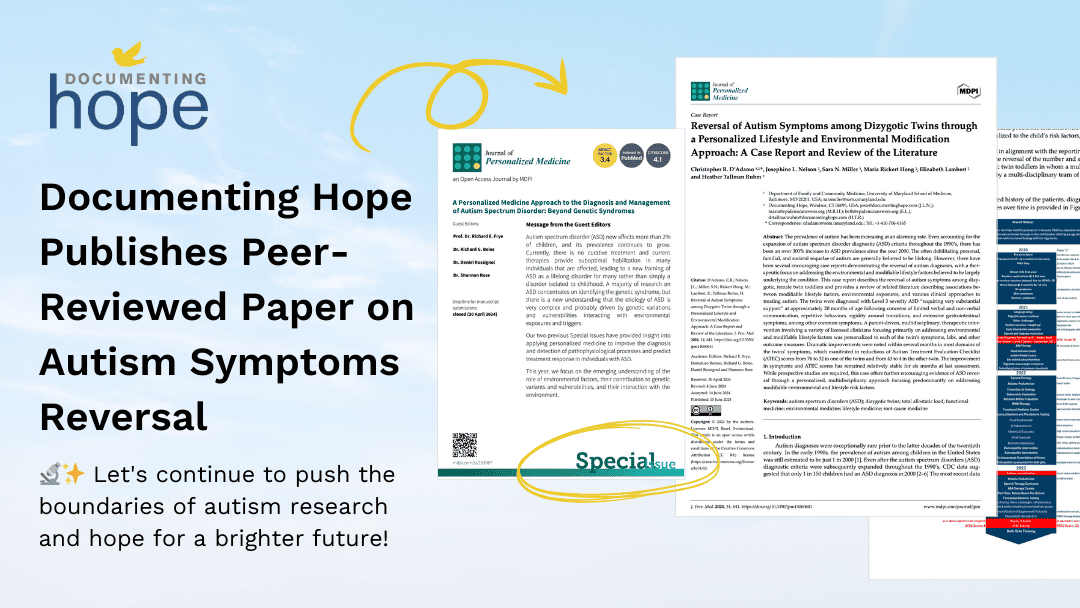We are thrilled to share the news that Documenting Hope has published a new paper, Reversal of Autism Symptoms among Dizygotic Twins through a Personalized Lifestyle and Environmental Modification Approach: A Case Report and Review of the Literature, in the Journal of Personalized Medicine, a prestigious peer-reviewed publication, on the reversal of symptoms in autism spectrum disorder (ASD). While autism often presents lifelong challenges, there is growing hope for symptom and diagnosis reversal.
Our latest publication details the extraordinary reversal of severe ASD symptoms in dizygotic female twin toddlers. Diagnosed at 20 months with Level 3 ASD, requiring substantial support, the twins exhibited limited communication, repetitive behaviors, and significant gastrointestinal issues.
Through a parent-driven, multidisciplinary intervention focusing on environmental and lifestyle factors, both twins showed dramatic improvements. Autism Treatment Evaluation Checklist (ATEC) scores dropped from 76 to 32 and 43 to 4, respectively, with stability over six months. What’s more, we have learned from the parents that the twins ATEC scores have continued to drop below what was originally published in this paper. This is very exciting news for this family and for the promise of symptom reversal in autism as a viable clinical outcome.
What Did the Family Do to Help Their Children?
The publication provides a very detailed history of the steps taken by the parents to support their children’s health and healing. Below is an excerpt from the paper that provides the parent account of interventions utilized in this case:
“Despite sharing similar genes and identical conception, gestation, birth experience, and post-natal factors—as well as benefitting from consistent nurture, home environment and family dynamics—each daughter presented an ASD diagnosis entirely uniquely. Early in our navigation, we adopted a ‘total load’ theory, understanding that there was not one ’single’ factor that catalyzed their diagnosis but the combined assault of many injuries. In accepting the very complex presentation of ASD, we also understood that there would be no singular ‘cure’ for it either. . . Our approach was therefore focused on following a nonconventional, holistic understanding of each daughter’s bio individual needs, exploring root cause and designing customized support. We began by choosing to pursue functional, integrative support centered around the foundational principles of diet, environment, and lifestyle. We vetted therapies that would deliver support in a naturalistic setting—primarily our home. We chose practitioners who were aligned in our belief in our daughters’ intrinsic ability to heal given the right support. We assembled a team that welcomed our engagement and worked cooperatively with each other. We committed to being highly involved in all the interventions we explored, educating ourselves and advocating for what we felt was best for our children. Finally, we were strategic in focusing on sequence, using labs and other evaluation tools to measure progress, and harnessing the power of innovation to map genes and address cellular health. Most importantly, in our experience as parents has been the desire to create and maintain a profound and loving bond with each of our daughters—and to remain parents, not practitioners. Through this approach, we have witnessed the radical recovery of one daughter—who presents today as a joyful, engaging, spirited, extremely bright 4-year-old. We remain steadfast in our support for our other daughter whose progress has also consistently amazed us and has reminded us that recovery is possible at each person’s individual pace.”
This case underscores the potential of personalized therapeutic approaches in mitigating ASD symptoms and potentially even leading to full loss of diagnosis. Documenting Hope is eager to continue this line of research that is so desperately needed by this Compromised Generation.
Help us continue to push the boundaries of autism research and hope for a brighter future for all of our children!
Support our research with a tax-deductible donation here:
#AutismResearch #ASD #Breakthrough #HealthcareInnovation #EnvironmentalHealth #LifestyleChanges #HopeForAutism #PersonalizedMedicine
Download the entire article PDF here.
View Children’s Health Defense review article of our study Twins With Autism Improved ‘Dramatically’ After Parents Focused on Reducing Toxic Exposures by Brenda Baletti.

